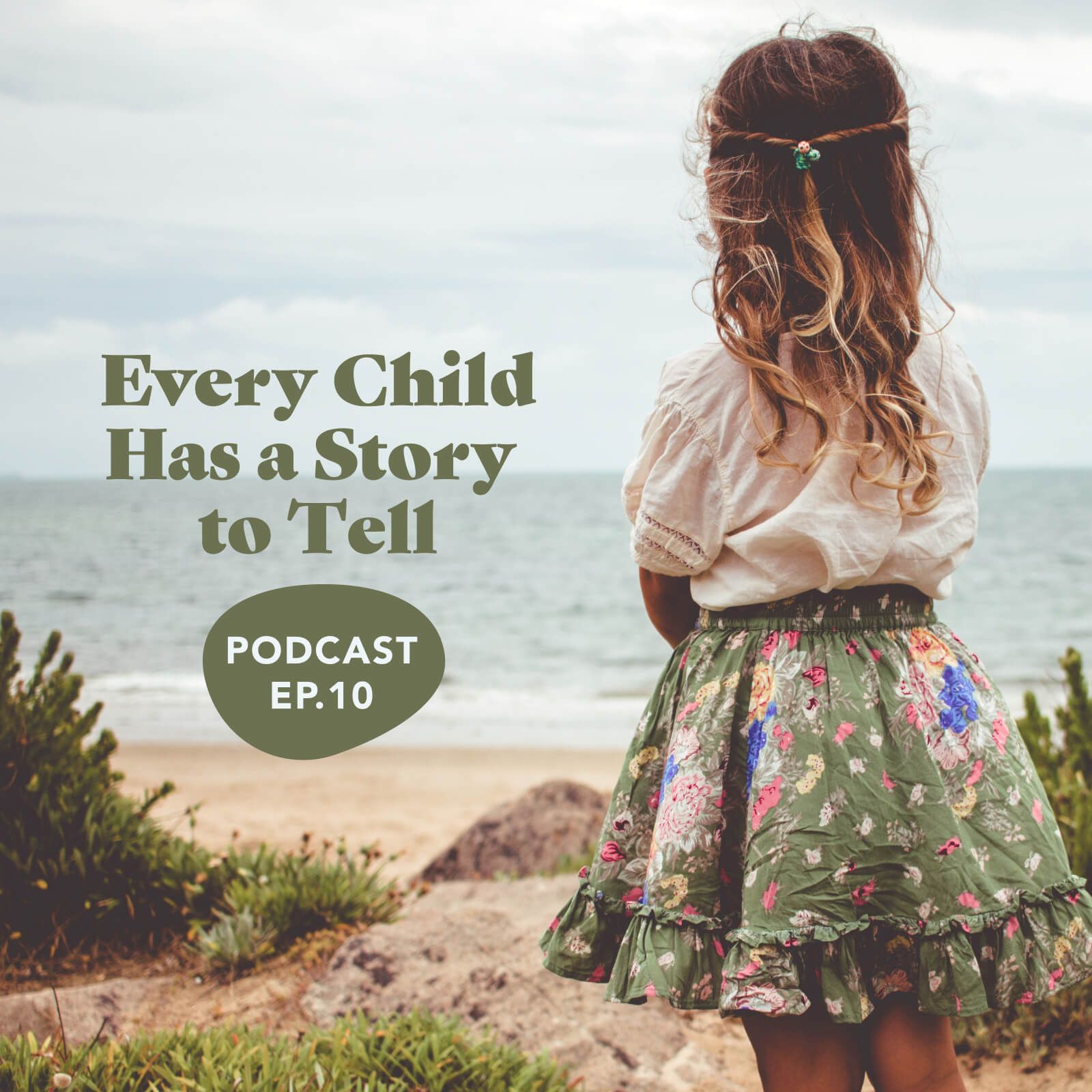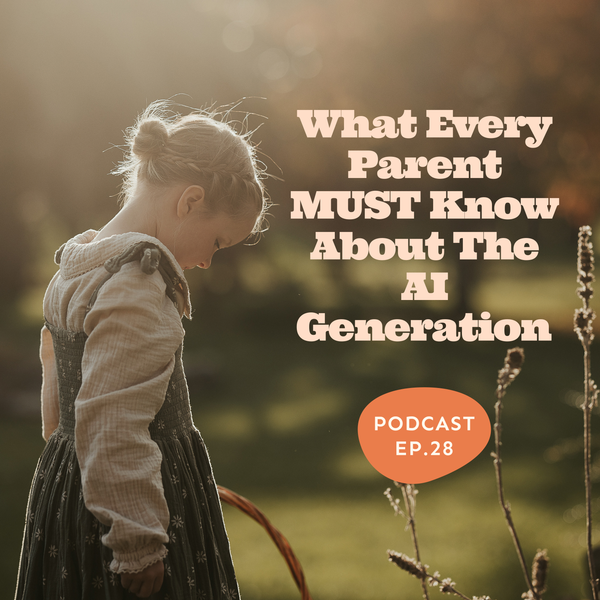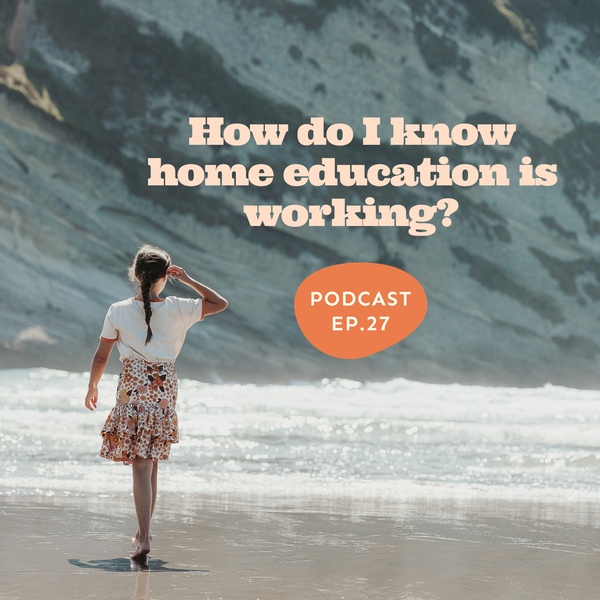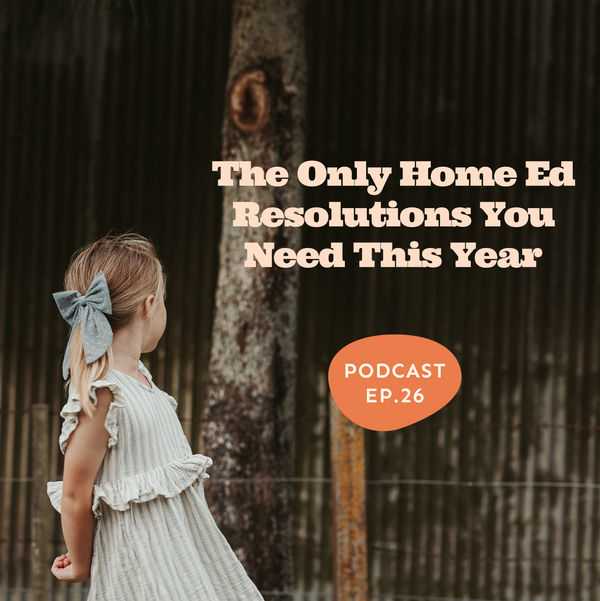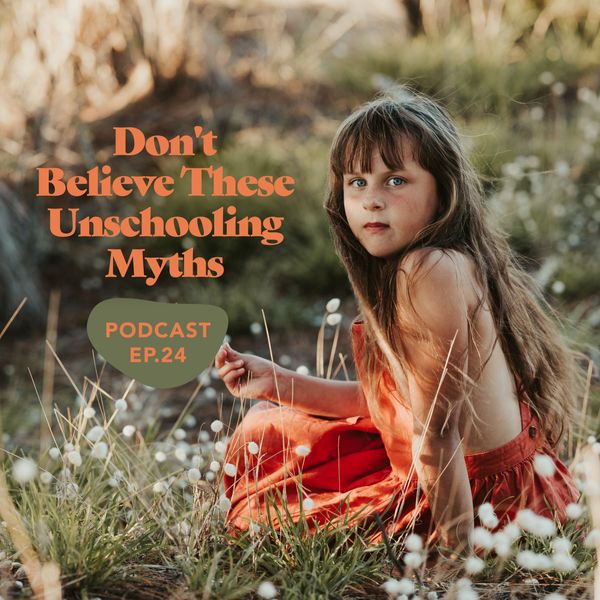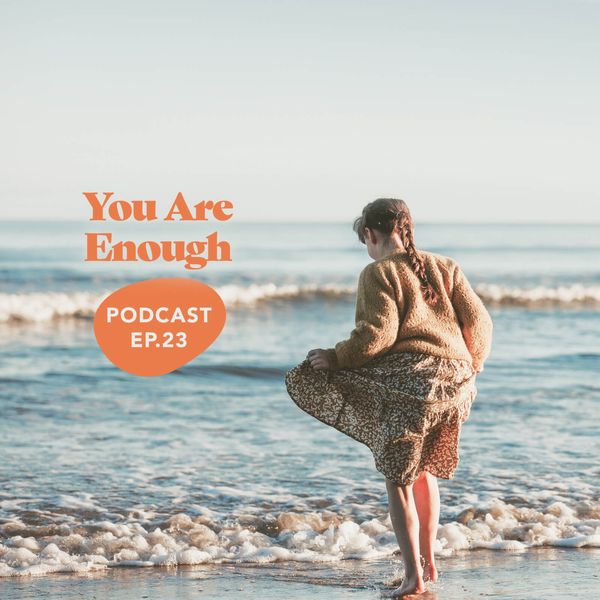Asking our children to all learn the same things, at the same times, in the same groups, in the same spaces, with only the same ages…
…is effectively asking them to become the same as everyone else.
It’s asking them to think less about their true selves, and more about what the most accepted version of it might be. It’s asking them to see their uniqueness as a bad thing, and fitting in as good. No, more than that – critical.
And to me, this fundamentally undermines what being a human being is all about.
See, I believe every child has their own story. And in this episode, I want to make a plea to let more of them tell it.
These private episodes go even deeper, backed by research, the science of how children learn and grow, and more than a decade of lived home educating experience. Each one is designed to help you rethink, reframe, and recalibrate the way you're walking this path, giving you the confidence to live the version of life you want. The Collection is 23 episodes strong and counting, with over 10 hours of listening available right now.
As a subscriber, you'll also get immediate access to my self-paced course, expert-led masterclasses recordings, five downloadable guides, our school exemption documents, and more 💛
Complete Transcript
INTRO
Helloooo and welcome to the Life Without School podcast, here to help you and your children live the life you want to, not just the one you’re told you should.
I’m Issy, a writer and unschooling dad from New Zealand.
You can find more about me at starkravingdadblog.com – all of my posts, podcast episodes, and short films created to encourage, support and reassure anyone walking this road less travelled.
Thank you so much for tuning in to listen today. Alright, let’s get into this week’s episode.
MUSIC
Welcome, again, as we start that run towards Christmas. This is a time of year I just absolutely love – I turn into a total kid. Our tree has already gone up, I’m walking around the house singing Christmas songs completely out of tune, and I’m literally counting down the days to when we can crack into day one on the advent calendar.
Thanks for tuning in again today. I’m still blown away by how many of you are listening to this each week, and I want to say thank you, again, for the messages of support and encouragement that you’ve been sending me. I still read your reviews every morning over coffee, because…they just…they make me smile.
Last week, in episode nine, I spent some time talking through the life changing power of trusting our children. Of the huge difference it can make to their lives when we give them time and space to explore the world on their own terms. And, equally, the freedom to decide what they won’t spend their time on.
Today, I want to add another important layer to that conversation. One that’s not talked about nearly enough in education, because most of our traditional thinking in that space focuses on very tactical things. Like…what our curriculum should include, how we should deliver it, the materials and physical spaces we should use, how progress should be assessed, how a lack of it should be addressed, and how we’ll keep track of it all.
The bit that comes before all that – what every child should be taught, and by what age – is taken as self-evident. The collection of core subjects (and the timing of comprehending them), for almost every single person ever born, is apparently quite obvious. It has been unanimously agreed. It needs no further discussion.
But it does, because it’s a mind-blowingly rigid starting point. A truly one-dimensional way of thinking. The least individually respectful, least trusting, least human approach to education you could possibly conceive of. And a domino that sets all sorts of consequences into motion for our children.
And it’s one of those key consequences that I want to talk about today.
By asking our children to all learn the same things, at the same times, in the same groups, in the same spaces, with only the same ages…
…is effectively asking them to become the same as everyone else.
It’s asking them to think less about their true selves, and more about what the most accepted version of it might be. It’s asking them to see their uniqueness as a bad thing, and fitting in as good. No, more than that – critical.
And to me, this fundamentally undermines what being a human being is all about.
When you choose to live a life without school, you get to draw a line in that sand. You get to say – no, who we are is far too important to set aside for the sake of a good education. In fact, if it doesn’t embrace that at its heart, then it is not a good education.
See, I believe every child has their own story. And today, I want to make a plea to let more of them tell it.
FOREST SOUNDS
Imagine you are walking through a forest. You pass patches of flowers, flax bushes, ferns, and vines. You follow a line of low shrubs, your eyes drawn up into the towering trees above.
You walk past a pond filled with water lilies, edged by tussocks. You stop beside a river, where you see moss growing on shaded rocks and yellow irises dotting the grassy banks. You reach the forest’s edge, blinking in the bright light as a lush green meadow stretches out in front of you.
You are struck by how beautifully complex nature is. By how no two things are exactly the same. By how clear it is that some things grow and thrive in some environments, and simply don’t – and never will – in others.
Later that day you walk into a classroom. You look around the room, pausing on each child’s face as you watch and listen to them interact.
You are struck by how beautifully complex humans are. By how no two of them are exactly the same. By how clear it is that while some of them might grow in this environment, many won’t and never will.
You leave the classroom, quietly closing the door on a physical space in which we’ve planted generations of children.
You sit down on a patch of grass, overwhelmed with clarity.
If a child isn’t thriving it is not because they need to do better at following instructions, or completing their homework, or adhering to the schedule. It is not because they need to be quieter, or more focused, or more committed.
It is because we’ve failed to provide them an environment in which they can actually grow.
END FOREST SOUNDS
If we tried to plant everything in the botanical world in the same ground, and expected it all to grow in the same kind of physical spaces, under the same conditions, the results would be obvious. We’d have some of our plants thriving, others managing to find a way to grow but not in the way they’ve been designed to, or to their potential, and then we’d have a whole lot that just can’t make it work. The conditions would be so at odds with what they need that it doesn’t matter what they do…they just can’t find a way to grow.
Some of those beautiful plants will tell the story they were destined to tell. Some will bloom. But not enough of them. Too many will never have the chance to show the world what they truly are.
I believe it is the same with people. We are complex, nuanced beings. Some of us are happiest when we’re pushing our bodies hard, and some of us are happiest curled up on a sofa with a good book.
Some of us walk into a room buzzing with people, confidently announcing our arrival at the party. Some of us could think of nothing worse than even going.
Some of us love to drive race cars, or climb up mountains, or jump out of aeroplanes. And some of us need a hand to hold when we ride in an elevator.
Some of us think in numbers. Some of us think in colours. Some of us think in daydreams.
We all have things that excite us, motivate us, challenge us.
We all have things that scare us, make us sad, worry us.
And not enough of us – as beautifully complex and unique as we are – are given the right conditions to grow.
MUSIC
My daughter Florence has just turned seven. That means it’s now been two years since she should have started school here in New Zealand.
If she had walked into a classroom as a five year old, right now she’d still be in the very early stages of an educational journey that would continue until the end of 2032.
Two thousand and thirty two. And during that time, she would be asked to spend more than 14,000 hours in a small set of classrooms.
Rewind your life to the start of 2009, and play back the time between then and this moment right now. Play back those 14,000 hours.
To put them in tangible terms, it’s the amount of time you’d need to set aside if you wanted to binge-watch seven thousand movies. It would take you 600 days, day and night, without hitting the pause button.
It’s the amount of time you would use flying from New York to London, and then back again, one thousand times.
It’s the time it would take you to listen to 150,000 songs, stand up to stretch your legs, then sit back down and listen to 100,000 more.
Back to Florence, and that’s how much time she’d be asked to attend a physical space someone else has decided she will learn best in, even if she doesn’t.
It’s how long she’d be required to build the knowledge and skills someone else has decided she should, whether they’re interesting to her or not.
It’s how long she’d be given direct and regular feedback from someone she may or may not want it from, tested against measures that may or may not be important to her, in ways that may or may not come naturally.
It’s how long her self-worth would be tied to a version of success she had no say in defining.
It’s how long she’d spend with someone else writing her story.
MUSIC
Waving goodbye to young Florence, we’re now turn to look at three teenagers sitting at their desks, waiting.
The first is deep in his imagination. In his mind he’s turning shapes into creatures, the way he does on a page, filling them with colour and character and pulling them into a story. He is a creative, artistic child, always imagining and dreaming and scribbling and drawing.
The second is running her fingers back and forward across her left knee, head tilted back, eyes closed.
She can hear the notes of the piano keys as she taps, her right foot rising and falling on an imaginary pedal. She is a musical child, always composing and playing and singing and listening.
The third is staring intently at the corner of her desk. At the way the curved metal leg has been attached to the wooden top, the rivet fitting neatly into the small dent that has been made just for it.
She is a practical, tactile child, always breaking and dismantling and fixing and building.
END MUSIC
The voice of an adult breaks the spell. “Ok, pay attention please. You’ve been learning how to solve quadratic equations. Today we will measure your ability to do so independently.”
The adult walks past their desks, placing a sheet of paper face down on each, before returning to the front of the room.
“You have 30 minutes to complete the test. Please begin.”
They turn their paper over, a series of equations swimming into view as they shake off their thoughts of telling stories and writing music and constructing things. If only, they all think desperately as they pick up their pencils, they’d been able to shut all that out during the lessons in the weeks prior.
Perhaps then the page sitting in front of them wouldn’t seem so scary. The equations so alien. The concept of solving them so impossible.
Scanning down the page, the most important lesson of the day was clear:
There was no place for daydreaming here. Writing their own stories would just have to wait.
MUSIC
It’s time to reassess the value of the story we’ve asked every child from the past few generations to live their lives as characters in.
The one our factory-like educational system has ensured sits within a specific, narrow band. Standards, tests and grades have held editorial control. Rough edges and variations have been written out.
And what we’ve ended up with is something like reading the same chapter, from the same genre of book, over and over and over again.
We must see now that you cannot standardise people, you cannot try and make everyone the same, at least not without collateral damage, and we should be looking back in shock that we ever even tried. Every human being on this planet is exceptional in their own way. Every person born is one of a kind. And every single child deserves the right to tell their story.
The sun is beginning to set on that factory. When dawn breaks, it will be our differences that shine.
I believe one of our most important responsibilities as parents is to give our children the opportunity to write their own life story. To help them find their voice, and their place in this world. To provide an environment where they can grow, and thrive, and bloom.
I want to close today’s episode with a short – let’s call it – poem. One that, I feel to the core of my being.
“The trouble with being curious”, the small child said, “is that my questions seem a nuisance, like I’m to listen instead.”
I want to understand. I want to dig deeper. I want to go back. I want to spend time. I want to pick up what I missed. I want to learn more, about less. I want to ask, and learn, and only move on when I’m ready.
But I’m told there’s no time for all that. There’s a plan, stretching far out in front of me, that I cannot change. The wheels are already in motion. They were before I was even born. Stopping to question, or slowing down to understand, will only hold everyone up.
I’m a child. I’m curious. I was born like this.
But I’m learning, so quickly, what a problem that is.
When our children are, hopefully, grey and old, how will they tell their story? And, what part will you play?
Thank you so much for being here with me today.
I’ll see you back here soon. Bye for now.


